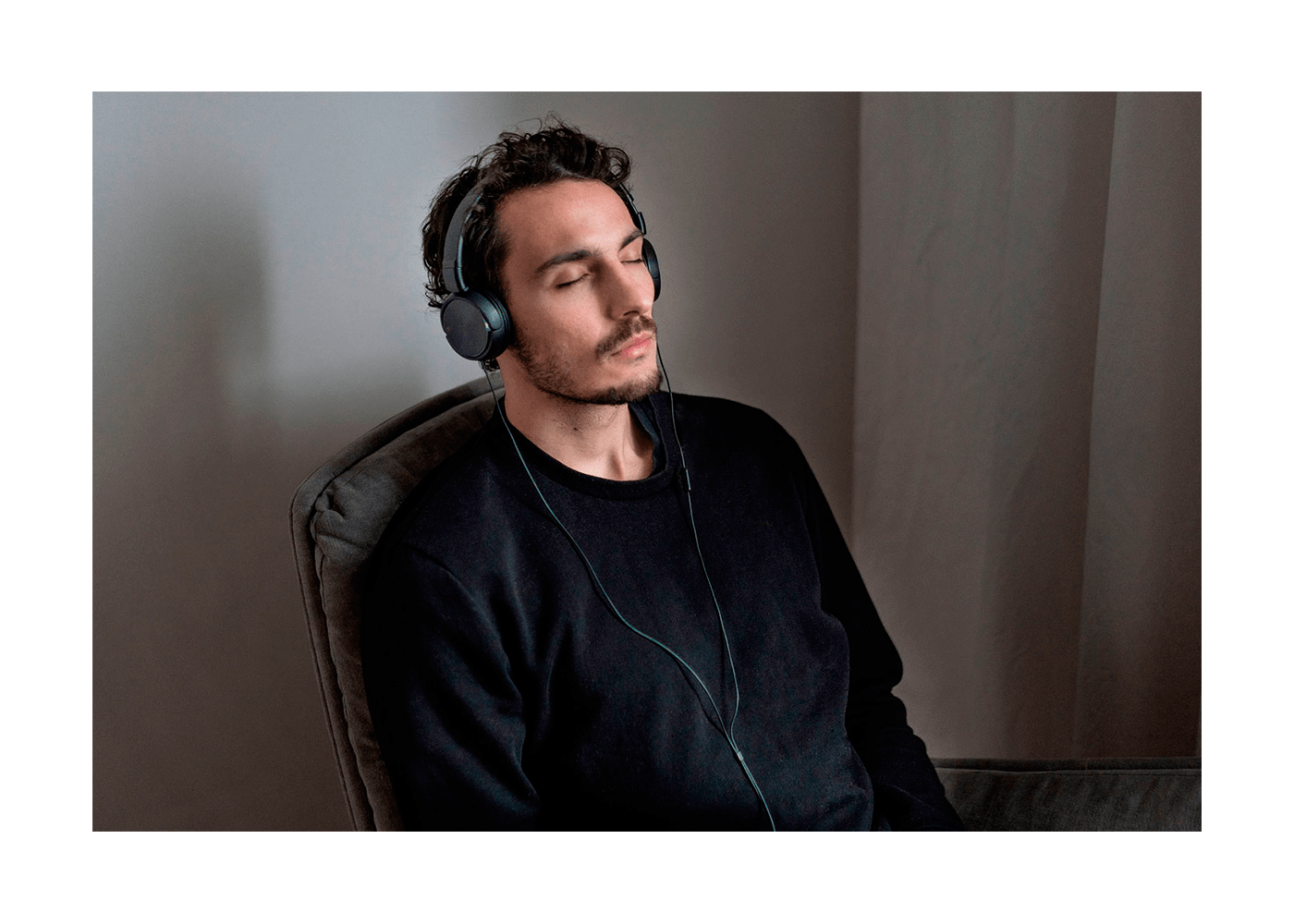What is Flow Training?
Download Flow Lab
Flow Lab is your AI-powered mental fitness app that helps you experience the highly productive Flow State more often. So get your 7-day free trial and it and train your mind with science-backed guided and personalized meditations: ![]()
![]()
This article was written by Flow Lab’s Head of Content and MSc. psychologist Eva Siem. She studied at the University of Groningen (NL) and is specialized in the area of performance and motivational psychology. In her articles, she combines findings from psychological research with practical tips from her experience as mental fitness coach and workshop trainer.
Are you familiar with sitting at a task for ages, but barely making any progress? Maybe you can’t pull yourself together or you get distracted easily. Yet, tasks pile up on your desk and you would rather use your time productively? Or perhaps you find it difficult to take a deep breath in your hectic everyday life because stress or anxiety prevent you from doing so? Would you rather gain confidence and find a feeling of ease again? Do you want more Flow? Then go ahead and start your Flow training now so you can develop all the skills that will enable you to enter the flow state more easily. Read on to find out more about it!
Flow: The Optimal Experience
The psychologist and happiness researcher Mihaly Csikszentmihalyi was the first one to defined Flow. It describes the mental state in which we are fully immersed in a challenging yet joyful activity and thereby completely lose track of time. We are highly concentrated and feel in effortless control.
Flow is considered an optimal experience because we’re not only unleashing peak performance, but also feel great.
Flow training involves finding the Sweet Spot
Tapping into Flow requires an ideal balance of perceived demands and skills. After all, if we perceive a task as too easy, we will be bored. Conversely, if a task seems to exceed our abilities, we may feel overwhelmed and anxious.
Therefore, it all comes down to finding the sweet spot: If task demands and skills match properly, an activity seems challenging but still doable. The “4% rule” states that, in fact, perceived task demands need to exceed our perceived skills by about 4 percent. So just enough to push us to our limits without overwhelming us. Then we enter the so-called “Flow Channel”, where we can achieve outstanding performance.
Why do some people experience Flow more often?
The Autotelic Personality
Some people seem to find this balance more easily and thereby, experience more Flow. How do they manage that? These so-called “autotelic” people possess certain skills and traits that enable them to recognize opportunities for Flow faster and manage challenge-skill imbalances more effectively.
When was the last time you were facing a challenge that stretched your skills and pushed you out of your comfort zone? Maybe you had an exam, presentation or important conversation coming up? And what feelings did that trigger in you? Were you stressed, anxious or completely at ease?
Scientists explain that Flow personalities are more capable of dealing with an imbalance between challenges and abilities: Even if a task seems too demanding, they can counter negative feelings like overwhelm or anxiety by managing stress and being optimistic. They see the task as a welcoming challenge to develop their own skills. Maybe the presentation will go great and you’ll learn to be more confident in front of others? Or you’ll learn to stand up for yourself in that important conversation?

However, not only too much stress, but also too little stress can prevent Flow. What we can learn from autotelic individuals is to actively seek new challenges or reframe a boring task to awaken curiosity.
Think about the moments when you can’t pull yourself together and would rather like to avoid a boring task. Perhaps there are details about this activity or topic that you haven’t noticed before and that you can become curious about? Can you optimize movement sequences or other processes to challenge yourself? Or is it possible to perform the task differently to avoid running on autopilot mode? And most importantly, what kind of mindset can you adopt to approach such situations with curiosity and joy?
Train the necessary Flow Skills
Finding the optimal balance to enter the Flow Channel is often easier said than done… Somehow, autotelic people manage it anyway. What makes it possible for them are so-called “metaskills“: Curiosity and interest help an autotelic person to get excited about both new as well as familiar things and to constantly seek more challenges. “Autotelic,” by the way, stems from the Greek words autós “self” and télos “goal,”. It thus describes a high level of intrinsic motivation, meaning that it is not external factors such as money or recognition that drive them. In fact, the activity itself is the goal giving them joy and satisfaction.
Stress, excessive demands and fear cannot get them out of the Flow state, because they have learned to regulate their emotions. Negative feelings and stress are, after all, subjective and arise in our minds. The good news is, we can also reduce them in our heads.
Autotelic people do not let their emotions control but rather regulate them so they can remain calm and composed even in stressful situations.
In addition to the ability to regulate their emotions, autotelic people are low in self-consciousness. In other words, they are not constantly preoccupied with their insecurities or brooding about what others might think about them.
Instead, they are able to actively control their attention. Their focus is solely on the task at hand and all potential distractions are blocked out. Maybe not everything goes according to plan – but setbacks don’t stop them from pursuing their goals with perseverance. If something doesn’t work out, they look for other ways to accomplish the task.
Seemingly ambivalent metaskills help autotelic people find more Flow
At first glance, these skills may seem a little ambivalent: For example, Flow individuals are curious and open to new challenges on the one hand. Yet they manage to pursue long-term goals and persevere in the face of adversity. However, they are not mutually exclusive: As you already know from above, it all comes down to the sweet spot. Flow personalities are good at balancing such aspects depending on their current challenge. Thereby, they are finding just the right middle ground to experience Flow.

The Flow Lab Training Program
Would you like to have these skills too? Then buckle up, you can train these “Flow Skills”. And thanks to neuroplasticity, regular Flow training will help you strengthen these skills neuronally in the brain.
Based on recent Flow research, we at Flow Lab have developed a training program: It teaches you the most important self-regulation skills and mindsets to increase Flow in everyday life.
Our Flow training summarizes the “metaskills” of Flow personality in four training areas:
Flow training area: Focus
How often does it happen that you are entirely absorbed in a task? With the exercises in the area of Focus you’ll improve your concentration, mindfulness and attentional control. You’ll learn to let go of distractions or disturbing thoughts to find and sustain Flow states. Concentration techniques as well as mental tools based on mindfulness-based stress reduction or creativity research will help you do so. This way you can use your time more effectively in the future and get into Flow more easily.
Flow training area: Ease
Stress and tension are familiar everyday companions for most of us. But it doesn’t have to stay that way! In order to transform these negative states into a welcoming challenge, you can learn to consciously regulate your physiology and emotions. Through methods such as progressive muscle relaxation, autogenic training, mental imagery and breathing techniques, you’ll learn to stay calm and collected even in stressful situations.
Flow training area: Optimism
How often do you feel like you have everything effortlessly under control? Are you convinced you can accomplish anything you set your mind to? Do you prefer high, challenging goals or rather to play it safe?
Don’t let negative feelings, anxiety or limiting beliefs hold you back! Everyone struggles with self-doubt and difficult emotions every now and then. But to avoid that they discourage you from taking steps out of your comfort zone, the Optimism sessions will help you challenge limiting beliefs as well as develop confidence, self-compassion and joy. To do so, you’ll make use of mental imagery, self-affirmations and cognitive reframing.
Flow training area: Drive
If you struggle to brace yourself up or to see meaning behind your actions, check out the Flow Sessions in the training area of Drive! They will help you amp up your motivation, transform boredom into an interesting challenge and pursue your goals with perseverance. The requirement for this is a growth mindset: the conviction that it’s a matter of effort whether you develop and expand your abilities rather than assuming they are set in stone. In the area of Drive, mental imagery, guided reflections and mental coaching tools are combined to implement exactly that.
By completing an entry assessment, you’ll find out your strengths as well as the Flow training area with your biggest untapped potential. Afterwards, you’ll get a training plan with Flow sessions tailored to your personal needs. With regular training, it’s possible to develop the Flow Skills of the Flow personality and to overcome your challenges with focus, motivation and Flow!
So go best yourself and train your Flow Skills!
